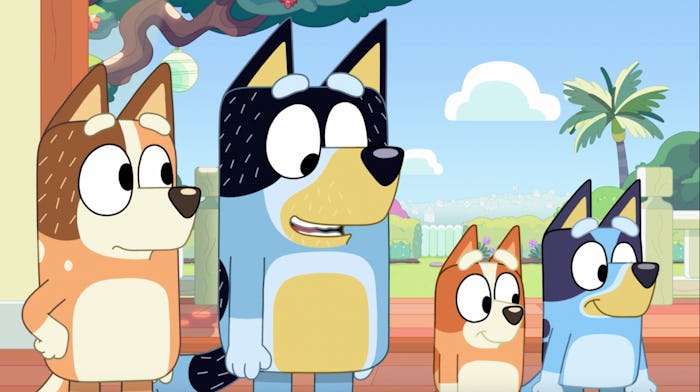now just a doggone minute!

There's A Viral Theory Going Around About Why Your Dog Loves To Watch Bluey
(Hint: it has to do with the fact that she’s a blue heeler...)
Bluey really is the kids’ show that just keeps giving. From laughter to tears, it’s inspired families to play... and also to come up with a seemingly never-ending slew of fan theories, some profound, some silly but fun, others downright “slanderous.” Recently, some fans have come up with a new Bluey theory that involves their own canine companions, suggesting that actual dogs love Bluey because it’s animated in dog-friendly colors.
First, you need to know a little bit of dog biology — something I did not think I would ever need in a professional capacity much less when broadly discussing cartoon dogs, but here we are. According to the American Kennel Club (AKC), while it was believed for many years that dogs were completely colorblind and viewed the world in black and white, more recently scientists have determined that the number of rods and cones (light-sensing cells in the eyes) show that canines are dichromatic, aka able to see a limited spectrum of two primary colors — yellow and blue. These adaptations made them very good at seeing movement in low-light, but seeing the precise hue of your favorite red lipstick or purple dress? Not so much.
But this brings us back to Bluey who, you may notice, is (as her name and breed suggest) blue. So is her dad, Bandit, Uncle Stripe, grandma Chris, grandpa Bob, and cousin Socks. Her mom and sister are red heelers, but are colored a soft, yellow-y orange. The Heeler family is, in fact, two colors that dogs can see pretty accurately.
This has left some dog owning Bluey fans positively shook.
“It took me 5 years to realize bluey the TV show is made in dog vision colors,” TikTok user @asheleyspam wrote. “Your dog can watch too.”
They’re not the only one to remark on this phenomenon. “Anyone else notice the Bluey characters are all already dog vision colors?” asks @thats_so_katie_. “Your dog can watch it too.”
Even the outlet Reel Rundown remarked “the Bluey team seems to have taken this into account and the main four (including many other characters), are colored in shades not only indicative of their respective dog breeds, but are also easily viewable by canine companions everywhere.”
I found an Instagram filter called PetVision to confirm and it’s true that Bandit and Bluey appear almost exactly the same to dogs as to people. Ditto Chilli and Bingo (albeit a little bit washed out).
But as thoughtful and detailed oriented as the fine folks who make Bluey are: I’m not buying this theory at all. Yes the main characters are rendered in colors that read pretty much the same for humans and dogs. But, like most children’s shows, it relies on a lot of bold, primary colors... of which dogs can see two out of three so this is perhaps less “incredible hidden detail” as it is “unremarkable coincidence.”
This theory also breaks down once you move past scenes that include any non-blue or yellow-ish characters or settings. For example, Coco the poodle is pink, Rusty (wearing a hat) is red, and the scene shown here from the episode “Keepy Uppy” is full of lush greens and bright reds...
But perhaps most importantly: dogs don’t know what colors they’re not seeing any more than you don’t know what smells you’re not smelling that they can. So they’re not watching Bluey and thinking “OMG! It’s so different than the rest of the world.” This is how they see everything.
So... no. Your dog doesn’t like Bluey because it’s in dog-friendly colors. They like Bluey for the same reasons we do: the heartfelt but hilarious story-first approach that poignantly explores childhood and modern parenting. (We assume.)
This article was originally published on